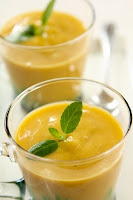If you've been asking yourself that question lately, here are a couple of good reads for you:
Food & Nutrition Magazine - Juice: From Weight Loss to Detox, this Trend Is Taking Off by Jessica Cording. May 5, 2012
Redbook Magazine - The Skinny on Juicing by Betsy Stephens
Here are the bullet points:
- Juice involves removal of the pulp which means removal of the fiber, whereas smoothies use the whole fruit or vegetable, thus keeping the weight-maintenance promoting fiber.
- There's no evidence that supports the claim that juicing helps increase the aborption of nutrients from the fruit or vegetable; however, there is lots of evidence to support consuming whole fruits & vegetables.
- There's also no evidence to support a need for "cleanses." Your liver and kidneys do the "detox" work.
- Juices & smoothies both provide liquid calories, which don't fill us up as much as solid food and could lead to consuming too many calories.
- Juice & smoothie diets, or cleanses, may provide short-term weight loss but ultimately may result in weight gain (see the last bullet), as well as deficiencies in certain vitamins, essential fatty acids & fiber.
I usually recommend limiting juice or skipping it completely. Smoothies are best used as a replacement for a snack or light meal and I typically advise to limit them to 1 per day. Try blending with plain Greek yogurt for some protein.
I almost never drink juice but I occassionally will have a smoothie. My favorite smoothies are the "shakes" from d'vida Health Bar in New York City. They use the whole fruit/vegetable (remember: fiber!) and sweeten their drinks with the Generally Recognized as Safe non-caloric sweetener Stevia. I'll have one as a snack or in place of lunch. They leave me feeling satisfied, not stuffed & bloated, and they don't leave your mouth with any coating or aftertaste.
Image: FreeDigitalPhotos.net / vanillaechoes


No comments:
Post a Comment